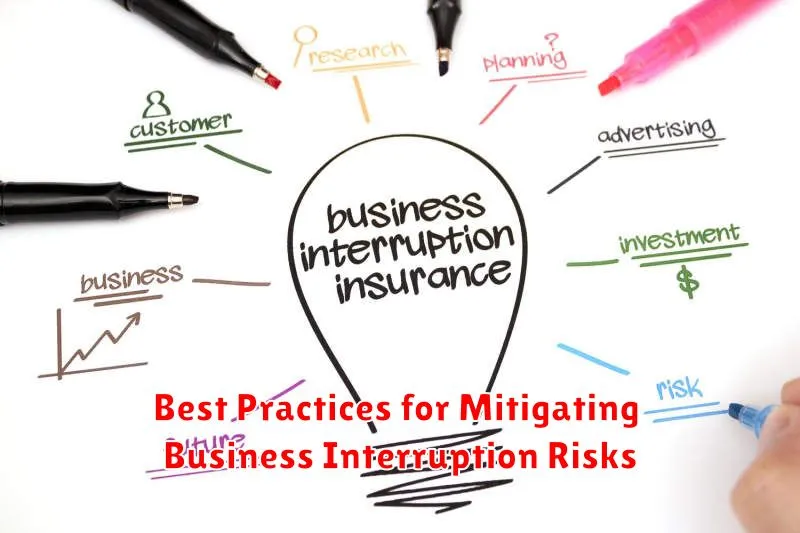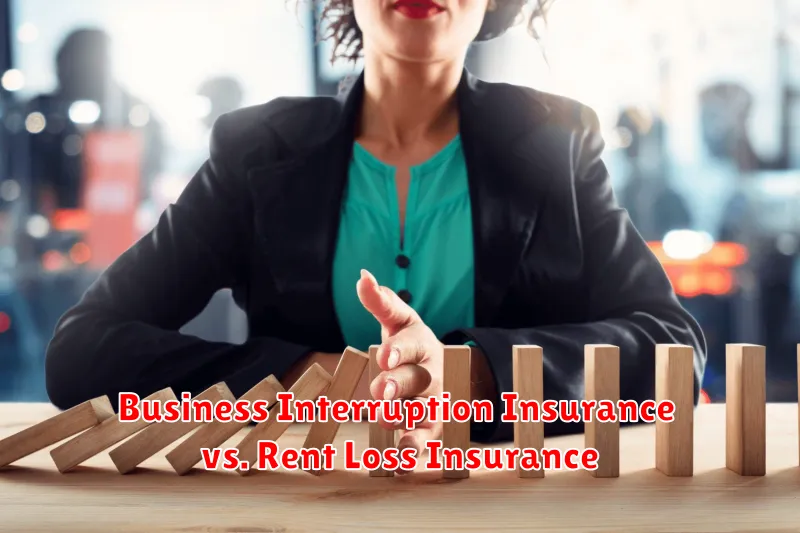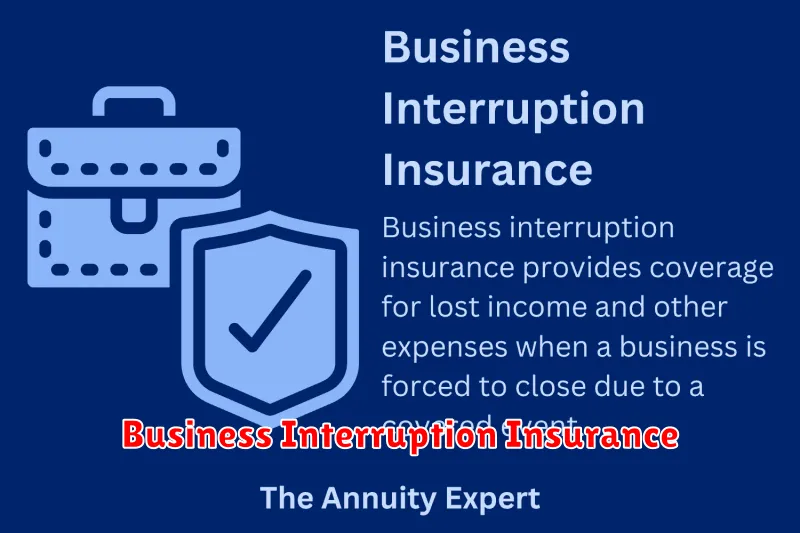As a landlord, you’ve worked hard to build a thriving rental business. From finding reliable tenants to maintaining your property, you’ve put in the effort to ensure a steady stream of income. But what happens when unforeseen events like fires, floods, or vandalism disrupt your operations? These unexpected occurrences can significantly impact your financial stability, leaving you with lost rental income and hefty repair costs. That’s where business interruption insurance comes in, acting as a crucial safety net to protect your financial well-being in the face of such challenges.
This comprehensive guide delves into the intricacies of business interruption insurance for landlords, exploring its benefits, coverage options, and how to choose the right policy for your unique needs. Whether you’re a seasoned property owner or just starting out, understanding the importance of this insurance can make all the difference in safeguarding your rental income and ensuring the long-term success of your business.
What is Business Interruption Insurance?
Business interruption insurance, also known as business income insurance, is a crucial coverage for landlords who rely on rental income. It protects you from financial losses if your rental property becomes unusable due to an insured event, such as a fire, natural disaster, or vandalism.
This type of insurance provides financial compensation to cover your lost rental income, as well as other ongoing business expenses, such as mortgage payments, property taxes, and utilities. It helps to keep your business afloat during the time it takes to rebuild or repair the property.
Essentially, business interruption insurance acts as a safety net, ensuring that your financial stability remains intact even when your rental income stream is disrupted. It’s a vital component of a comprehensive risk management strategy for landlords.
Understanding the Risks Covered for Landlords
Landlords face numerous risks that can disrupt their rental income. Business interruption insurance is a crucial tool to protect your financial stability in the face of these unforeseen events. Business interruption insurance for landlords typically covers losses resulting from:
- Property damage: Fire, storms, vandalism, or other incidents that render the rental property uninhabitable.
- Civil unrest: Riots, strikes, or protests that lead to property damage or disruptions to tenant access.
- Natural disasters: Earthquakes, floods, or other natural events that damage the property or make it unsafe for tenants to occupy.
- Legal issues: Eviction lawsuits, tenant claims of negligence, or other legal proceedings that prevent tenants from occupying the property.
- Government action: Orders to evacuate the property or restrictions on rental activities due to health or safety concerns.
It’s important to note that the specific coverage and exclusions vary between insurance policies. Review your policy carefully to understand the exact risks covered and any limitations. Consult with your insurance broker to ensure that your policy adequately addresses the specific risks you face as a landlord.
Calculating Potential Business Interruption Losses
Business interruption insurance is designed to help you recover lost rental income due to unforeseen events. But to understand its true value, you need to calculate your potential business interruption losses.
Here’s a simple breakdown:
- Estimate your monthly rental income: This is your baseline income you’d be losing if the property becomes unusable.
- Factor in vacancy rates: Account for the time it might take to find new tenants after an event. This helps you determine how long you might be without income.
- Consider fixed expenses: List all fixed expenses you still need to pay even without tenants, such as mortgage, property taxes, and insurance.
- Calculate your potential loss: Subtract your fixed expenses from your estimated monthly income and then multiply by the number of months you anticipate being without tenants.
This basic calculation can help you determine the amount of business interruption insurance you need. It’s important to remember that this is just an estimate. Consult with your insurance agent to accurately assess your individual needs and ensure you have adequate coverage.
Factors Affecting Business Interruption Insurance Costs
Business interruption insurance is crucial for landlords as it protects their rental income in the event of an unexpected disruption. Understanding the factors that influence the cost of this insurance can help you make informed decisions and secure the best coverage for your needs.
Location: The risk of specific perils, such as natural disasters or crime, varies depending on your property’s location. Higher-risk areas generally lead to higher insurance premiums.
Property Type: The type of property you own, such as a single-family home, apartment building, or commercial space, influences the potential for losses and, consequently, the insurance cost.
Occupancy: The number of tenants and the type of businesses operating in your property play a significant role in determining the likelihood and severity of disruptions. Higher occupancy or more complex businesses can increase premiums.
Coverage Limits: Your chosen coverage limits, which determine the maximum amount of rental income you can recover, directly impact the cost. Higher coverage limits generally result in higher premiums.
Deductible: The deductible, which is the amount you pay out of pocket before insurance coverage kicks in, influences the premium. A higher deductible often means lower premiums.
Claims History: Your past claims history, if any, can affect your premium. A history of frequent or large claims may lead to higher premiums.
Risk Management Measures: Implementing robust risk management practices, such as security systems, fire suppression systems, and regular maintenance, can demonstrate your commitment to mitigating risks and potentially lower your premium.
By considering these factors, you can gain a better understanding of the cost of business interruption insurance and make informed decisions to secure the best protection for your rental income.
Coverage Options and Add-ons for Landlords
Business interruption insurance policies for landlords can be customized to provide specific coverage options and add-ons. These can significantly enhance your protection and peace of mind.
Basic Coverage typically includes protection against loss of rental income due to covered perils like fire, theft, vandalism, and natural disasters. It covers the time it takes to repair or rebuild the property, allowing you to continue receiving rent payments even when the rental unit is unusable.
Additional Coverage Options can be added to your policy to provide broader protection:
- Extended Coverage: Includes protection against additional perils like earthquake, flood, or windstorm, depending on your location and risk profile.
- Loss of Use Coverage: Covers expenses incurred while relocating tenants during repairs, such as temporary housing or moving costs.
- Liability Coverage: Protects you from claims made by tenants or third parties for injuries or damages occurring on your property.
- Vacancy Coverage: Provides coverage for periods of vacancy due to covered perils, ensuring you can continue to pay your mortgage and other expenses.
- Additional Living Expenses Coverage: Covers your own living expenses if you’re forced to relocate due to damage to your primary residence while your rental property is being repaired.
Add-ons can further enhance your policy:
- Ordinance or Law Coverage: Covers the cost of complying with building codes and ordinances that may change after a covered event.
- Increased Cost of Construction Coverage: Provides protection against increased construction costs due to inflation or material shortages.
- Debris Removal Coverage: Covers the cost of removing debris from your property after a covered event.
- Spoilage Coverage: Protects against loss of inventory or perishable goods, particularly relevant if you rent out commercial property.
The specific coverage options and add-ons available will vary depending on the insurance company and your individual needs. Consult with your insurance agent to determine the most comprehensive and cost-effective policy for your unique situation.
Choosing the Right Policy Limits and Deductibles
Determining the right policy limits and deductibles for your business interruption insurance is crucial to ensure adequate coverage in the event of a covered loss. Here’s a breakdown of how to make informed decisions:
Policy Limits represent the maximum amount your insurer will pay for covered losses. Consider the following factors when deciding on policy limits:
- Rental income: Calculate your average monthly rental income and multiply it by the estimated time it would take to repair or rebuild your property.
- Expenses: Include ongoing expenses like mortgage payments, property taxes, utilities, and insurance premiums.
- Potential loss of future income: Factor in any potential loss of future rental income due to tenant relocation or market fluctuations.
Deductibles are the amount you pay out-of-pocket before your insurance coverage kicks in. Higher deductibles generally result in lower premiums. Consider the following factors:
- Financial reserves: Assess your ability to cover the deductible in case of a loss.
- Risk tolerance: Determine your comfort level with assuming some financial responsibility for smaller losses.
- Premium savings: Compare the premium savings associated with higher deductibles against your financial capacity.
Consult with your insurance broker: Discuss your specific needs and circumstances with your broker to determine the optimal policy limits and deductibles for your rental property. They can help you analyze your risk profile, calculate potential losses, and identify cost-effective solutions.
Filing a Business Interruption Claim Successfully
If you’re a landlord, business interruption insurance can protect your rental income in the event of an unexpected event that disrupts your business. However, getting your claim approved and receiving compensation can be a lengthy and complex process. This article provides essential tips for filing a business interruption claim successfully.
1. Keep meticulous records: Accurate documentation is vital. Keep detailed records of your rental income, expenses, and any other relevant financial information. This includes leases, rent receipts, and any contracts related to your property. These records will be crucial in supporting your claim.
2. Report the incident immediately: As soon as an event occurs that disrupts your rental business, contact your insurance company and report the incident promptly. Ensure you provide all necessary details, such as the date and time of the incident, the nature of the disruption, and the potential impact on your rental income.
3. Work with your insurance provider: Cooperate fully with your insurance company and provide all requested documentation. Follow their guidelines for filing a claim and respond promptly to any inquiries. Be clear and concise in your communication, providing detailed explanations of the incident and its impact on your rental income.
4. Focus on proving lost income: The most important part of your claim is demonstrating the financial losses you’ve experienced due to the interruption. This might include lost rent, repairs, and other expenses associated with getting your property back in working order. Your records will be invaluable in supporting your claim for lost rental income.
5. Consult a professional: If you find the claims process challenging, consider seeking guidance from a qualified insurance professional or an attorney specializing in business interruption claims. They can provide expert advice, ensure your claim is filed correctly, and help you navigate the process efficiently.
Case Studies: Real-Life Examples for Landlords
Business interruption insurance isn’t just a theoretical concept; it’s a lifeline for many landlords who have experienced unforeseen events. Here are a few real-life examples of how this insurance has made a difference:
Case 1: The Fire That Left a Landlord Struggling.
A landlord in New York City had a fire break out in one of his apartment buildings. The fire caused significant damage, rendering the units uninhabitable. While the landlord had property insurance to cover the physical damage, he was left with no income as he couldn’t rent out the units during the lengthy reconstruction process. Luckily, he had business interruption insurance, which provided him with a monthly income stream to cover his expenses and mortgage payments until the building was repaired.
Case 2: The Unexpected Evacuation.
A landlord in Florida owned a vacation rental property. During hurricane season, a mandatory evacuation order was issued for the area due to an approaching storm. While the property was thankfully spared from any physical damage, the landlord lost rental income for the entire duration of the evacuation. Thanks to his business interruption insurance, he received compensation for the lost rental income, allowing him to cover his bills and keep his business afloat.
Case 3: The Water Pipe Burst That Caused Chaos.
A landlord in California experienced a major plumbing disaster. A water pipe burst in one of his apartment buildings, causing severe water damage to several units. While he had property insurance to cover the repairs, the units were uninhabitable for several months. Business interruption insurance stepped in, providing the landlord with a steady income stream to cover his expenses and mortgage payments until the units were repaired and tenants could move back in.
These case studies demonstrate the vital role business interruption insurance plays in protecting landlords from financial hardship in the face of unforeseen events. It’s not just about covering physical damage; it’s about ensuring your rental income remains stable, even when your property is unavailable for rental. By investing in this essential coverage, you can safeguard your business and give yourself peace of mind.
Best Practices for Mitigating Business Interruption Risks

While business interruption insurance is a crucial safety net, proactively mitigating risks is equally important to protect your rental income. Here are some best practices:
1. Comprehensive Tenant Screening:
Thorough tenant screening is essential to minimize the risk of problematic tenants who may cause damage or disrupt other tenants. Utilize credit checks, background checks, and rental history verification.
2. Robust Lease Agreements:
A well-drafted lease agreement outlines tenant responsibilities, clarifies expectations, and provides legal protection. Include clauses regarding property maintenance, damage liability, and eviction procedures.
3. Regular Property Maintenance:
Preventative maintenance is key. Regular inspections, repairs, and upgrades can significantly reduce the likelihood of breakdowns, accidents, and unexpected repairs that could disrupt operations.
4. Emergency Response Plan:
Develop a detailed emergency plan outlining actions to be taken in case of a fire, natural disaster, or other unforeseen events. This plan should include contact information for relevant parties, evacuation procedures, and communication strategies.
5. Secure Property Management:
Utilize reliable property management services or a dedicated property manager. A professional manager can handle tenant communication, maintenance requests, and financial management, reducing the risk of errors and oversights.
6. Ongoing Training and Education:
Stay informed about best practices in property management and risk mitigation. Attend industry conferences, workshops, and webinars to stay up-to-date on legal requirements, safety protocols, and emerging technologies.
Working with an Experienced Insurance Broker

When it comes to protecting your rental income, having the right insurance is crucial. But navigating the complex world of insurance policies can be daunting. That’s where an experienced insurance broker comes in. A broker acts as your advocate, working with you to identify your specific needs and find the most suitable business interruption insurance policy.
Here’s why working with an experienced insurance broker is essential:
- Expertise and Knowledge: Brokers possess in-depth knowledge of the insurance market and various policy options. They can guide you through the complexities of different policies and help you understand the nuances of business interruption insurance.
- Personalized Solutions: They take the time to understand your unique circumstances, such as the size of your rental property, your tenant profile, and potential risks. This allows them to tailor a policy that effectively addresses your specific needs.
- Negotiation Power: Brokers have established relationships with multiple insurance providers, which gives them leverage to negotiate competitive rates and terms on your behalf. They can also secure favorable conditions and coverage options.
- Claims Support: In the unfortunate event of a claim, a broker can be an invaluable resource. They can assist you with the claims process, ensuring it’s handled smoothly and efficiently.
By working with an experienced insurance broker, you gain access to expert guidance, personalized solutions, and strong negotiation power. This helps you secure the best business interruption insurance policy to protect your rental income and provide peace of mind.
Business Interruption Insurance vs. Rent Loss Insurance

Landlords face a unique set of risks, and protecting rental income is paramount. Two key types of insurance policies often come up in this context: business interruption insurance and rent loss insurance. While both provide coverage related to lost income, their scope and focus differ significantly. Understanding the distinctions is crucial for making informed decisions about your property insurance.
Business interruption insurance, as the name suggests, is designed to cover the loss of income a business suffers when it is unable to operate due to a covered event, such as a fire, storm, or other disaster. This policy is typically geared towards businesses with ongoing operations, like restaurants, stores, or factories, and compensates for lost profits, fixed expenses, and continuing operating costs during the downtime.
In contrast, rent loss insurance specifically targets the financial losses landlords incur when their property becomes uninhabitable due to a covered event and tenants are unable to pay rent. It focuses on the loss of rental income and often includes coverage for additional expenses like temporary housing for tenants or marketing costs for finding new ones.
To illustrate the differences, consider a scenario where a fire damages a rental property. While business interruption insurance would protect the owner of a business operating from the property by covering lost profits and operational expenses, rent loss insurance would cover the landlord’s lost rental income due to tenants being unable to occupy the property.
The key takeaway is that business interruption insurance addresses the broader impact of business disruptions, including lost profits, while rent loss insurance specifically focuses on safeguarding rental income in the event of a covered event that makes the property uninhabitable.

